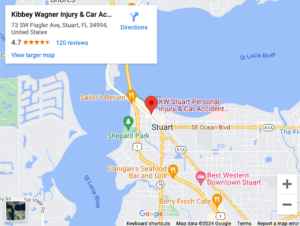
Most personal injury cases are based on negligence claims. Breach of duty is the second legal element of a negligence claim. The elements of negligence are duty, breach of duty, causation, and damages.
If you cannot prove that the other party breached their duty of care, you cannot recover compensation for damages in a personal injury case. However, before you can prove breach of duty, you must begin by proving a duty existed.
What Is a Duty of Care in a Personal Injury Claim?

A duty requires a party to perform specific conduct. For example, in personal injury cases, the duty of care is the requirement that a party acts with reasonable caution to avoid causing harm or injury to a person.
The duty might exist because of a statute or legal standard. A duty could also be created because of a custom or principles of right and wrong.
Therefore, the first element in proving that a person is responsible for your damages is to prove that person owed you a duty of care.
Breaching the Duty of Care
Breaching the duty of care means the party’s conduct did not rise to the level of the “reasonable person” standard. The standard is based on the facts of the case. Therefore, it can differ depending on the circumstances.
Jurors decide whether a defendant breached the duty of care by:
- Determining what a reasonable person would have done in the situation; THEN,
- Decide if the defendant’s conduct met that level of care.
In other words, the jury members decide what a person with ordinary care and prudence would have done in the situation. If the defendant’s acts or omissions fail to meet that standard, the jurors might find the defendant breached the duty of care.
Examples of Breach of Duty in Personal Injury Cases
It can help to understand breach of duty when you consider examples that could happen in real life:
- A hotel manager received reports there were bed bugs in a specific room but did nothing about it.
- A person consumes a large amount of alcohol and decides to drive a vehicle.
- A property owner knows exposed wires are on the outside of their building but does nothing to fix it.
- A physician fails to order an MRI when the patient presents with symptoms of traumatic brain injury.
- A restaurant owner fails to clean up a spill after noticing liquid on the floor.
In each of the above instances, a party owed another party a duty of care and breached the duty of care. For example, property owners owe guests and invitees a duty of care to maintain safe premises. Doctors owe their patients a duty of care to provide competent medical services. Drivers owe others on the road a duty of care to follow traffic laws and avoid dangerous driving behaviors.
Proving the duty of care is the first step. Next, you must prove the person breached the duty of care. For example, a driver who operates a motor vehicle under the influence of alcohol breaches their duty of care to operate a motor vehicle with care, which could lead to a car accident. Likewise, the restaurant owner failed to clean up a spill that could cause a slip-and-fall accident.
After proving a duty existed and that the person breached the duty, you must prove the breach of duty caused your injuries and damages. If you cannot prove causation, you cannot recover damages.
What Damages Can I Recover for Breach of Duty?
Provided you prove that the other party caused your injury and you sustained damages, you can receive reimbursement for economic damages. You can also recover compensation for non-economic damages.
Damages in a personal injury claim include:
- Physical injuries
- Pain and suffering
- Medical bills and expenses
- Emotional distress and trauma
- Loss of income
- Mental anguish
- Loss of enjoyment of life
- Reduction in earning capacity
- Out-of-pocket expenses
- Diminished quality of life
- Impairment and disability
How much your personal injury claim is worth depends on various factors. You have the burden of proving each element of a negligence claim. If you cannot prove all legal elements, you cannot recover compensation for your injuries.
How Does Comparative Fault Impact Breach of Duty?
Even though a party owes you a duty of care, the law does not hold that person liable for your actions that contributed to the cause of your injury. However, being partially to blame for the cause of an accident does not mean you cannot recover any money for a claim. You can still hold the at-fault party liable for their portion of the damages.
Under Florida’s comparative fault law, your compensation for damages is reduced by your percentage of fault. For example, suppose a jury finds you were 33% at fault for the cause of your motorcycle accident. As a result, you can only receive 67% of the compensation awarded to you for damages.
Call Now for a Free Consultation With a Stuart Personal Injury Lawyer
Proving a breach of duty can be challenging. However, our legal team can help. Call our law firm at (772) 444-7000 to schedule a free consultation with one of our experienced Stuart personal injury attorneys at Kibbey Wagner Injury & Car Accident Lawyers Stuart.

